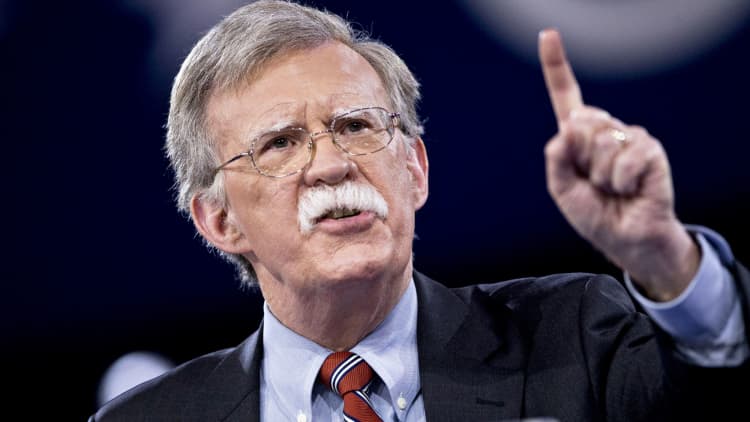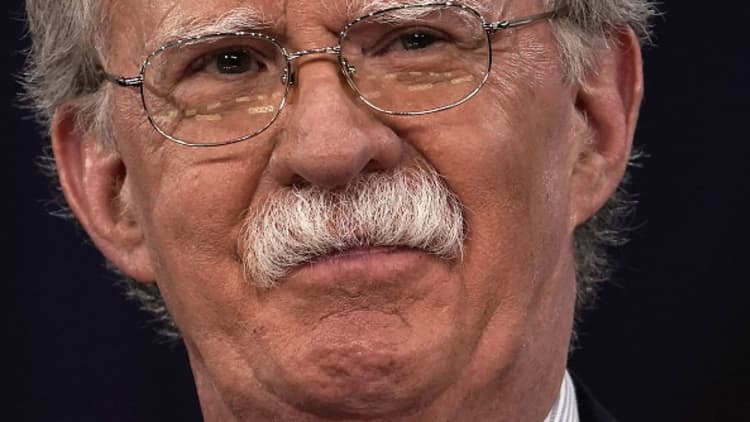
John Bolton, President Donald Trump's third national security advisor in just over a year, started his new job Monday and already he has his plate full of crises and global tensions to deal with. The most pressing is Syria, given the developments over the weekend.
Since Bolton accepted the job two weeks ago to replace H.R. McMaster, the Trump administration has ratcheted up its already extensive array of national security challenges, including a diplomatic row with Russia, a brewing trade war with China, ongoing negotiations to set up nuclear talks with North Korea, and the president's order to send National Guard troops to the U.S. border with Mexico.
Over the weekend, Trump helped push Syria back to the forefront of U.S. foreign policy debates. In a tweet, he hinted at retaliating against a deadly chemical weapons attack believed to be carried out by supporters of Syrian President Bashar Assad, warning of a "big price" to pay.
In the tweet, Trump also singled out Russian President Vladimir Putin for backing the Assad regime. The remark was especially significant since, despite repeated accusations of malfeasance against the Russian leader, Trump has often refrained from directly and publicly criticizing Putin.
On Monday, Trump said his administration was studying the situation and would make a "major decision" over the next two days. Neither the president nor Defense Secretary James Mattis ruled out potential military action against Assad.
"It seems new national security advisor John Bolton could be starting his first day in the White House in the worst way possible: by having to plan a military strike on Assad's ability to deliver chemical weapons attacks in Syria," Harry Kazianis, director of defense studies at the Center for the National Interest, told CNBC.
"Surely, this is not the way Bolton thought his tenure on the National Security Council would start. Most thought he would be dealing with a still tough situation with North Korea," Kazianis said, referring to a potential summit between North Korean leader Kim Jong Un and Trump.
The rapidly growing crisis in Syria
The apparent chemical attack in Douma, a rebel-held town in Syria, over the weekend came days after Trump said he wanted to pull U.S. forces out of the country. "I want to bring our troops back home," he said.
The president said much of his rationale was based on how well U.S. forces were getting rid of ISIS fighters in Syria.
"We've almost completed that task, and we'll be making a decision very quickly in coordination with others as to what we'll do," Trump said Tuesday at the White House.
The president's comments were met with pushback from national security advisors, who urged that the fight against ISIS was almost finished, but that a complete withdrawal of American forces at this time would risk losing gains. The president reportedly agreed to keep U.S. troops there, albeit reluctantly.
Russia, Iran and Turkey are the three major powers poised to further influence the war if the U.S. decides to pull out. Assad's strongest backers are Russia and Iran while Turkey supports anti-Assad insurgents.
Sen. John McCain, R-Ariz., said Sunday that talk of a U.S. withdrawal "emboldened" Assad to carry out the alleged chemical attack. Meanwhile, Russia and Syria blamed Israel for carrying out an airstrike Monday on a Syrian air base near Homs. While Israel has struck Syrian army locations many times in the course of its neighbor's 7-year-old civil war, the nation has neither confirmed nor denied the raid.
The strike took place hours after Trump warned on Twitter of a "big price to pay" following the reports of the poison gas attack on Douma, which killed 60 people and wounded another 1,000.
Where Bolton comes in
Yet even after Trump was applauded by many, including McCain, for ordering strikes on a Syrian airfield last year in response to another poison attack, this time around there could be more calls for congressional involvement in any response. This is something Bolton would likely have to consider in his advice to the president.
"The president should not act on his own, as there is no declaration of war or authorization for the use of military force against Syria. Last year's strikes were unauthorized and strategically ineffective," retired Army Lt. Col. Daniel Davis, who served under McMaster during the Persian Gulf War, told CNBC. "Doubling down would further erode our constitutional norms here at home, and that should worry everyone."
In addition to that thorny issue, Bolton's close physical proximity to the president, who is known for impulsively spouting off policy ideas, is likely to make his job even more intense. Trump enjoys the company of his preferred staffers in the Oval Office for much of the day, where the president often asks his closest aides to weigh in on subjects far outside of their professional expertise.
For Bolton, these frequent informal meetings with his new boss could leave him with even less time to formulate policy to match Trump's agenda and off the cuff remarks. Complicating matters, with several thorny issues confronting the U.S., Bolton will inherit a staff of several hundred specialists from the Pentagon, State Department and U.S. intelligence agencies.
There's also the looming issue of the Obama administration's nuclear deal with Iran. Both Trump and Bolton have been critical of the pact, and the president has called out Iran for supporting Syria during its attacks. Having Bolton on board in the White House could spell trouble for the deal.
"It must be ripped up," Bolton tweeted in January.
WATCH: Bolton will be advocate for hardline policies



